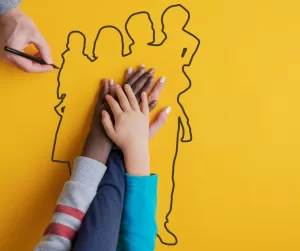
How do you think your kids experience you? Do they expect loving, positive attention and trust or criticism and judgement? Or no attention at all until they cause a problem? Watch yourself and see what they respond to.
Whenever you yell, threaten, punish, or use that blaming tone that turns your child “parent deaf”, you are teaching your children that they are a problem—because you see them as a problem. What you want is the problem to end, but what you are focusing on—what your child is doing wrong—makes the problem worse.
What you want to grow is your child’s capability.
So trust your child’s capability to overcome problems. This requires a mindset shift and understanding what trust really means. Your trust is needed 24/7, especially if your child is behaving in untrustworthy ways.
It’s not about trusting behavior or even your child’s current motivations. It’s about trusting who your child is and that he wants to do things right. The fact that things are going wrong can be corrected by your change in focus.








 As far as I can tell, most parents want their children to reach launch-age fully capable of conducting their lives with responsibility and respect. When they leave the safety of their nests with self-confidence, feeling competent and resilient, with the drive to contribute positively to the world, they are ready to greet whatever comes at them. We want our children to go out into the world capable of finding success yet able to weather the bumps and storms with a strong sense of self.
As far as I can tell, most parents want their children to reach launch-age fully capable of conducting their lives with responsibility and respect. When they leave the safety of their nests with self-confidence, feeling competent and resilient, with the drive to contribute positively to the world, they are ready to greet whatever comes at them. We want our children to go out into the world capable of finding success yet able to weather the bumps and storms with a strong sense of self.
 Your goal for your children is to raise strong, self-confident, resilient, independent humans who contribute to society, right? This doesn’t just happen somewhere in the teen years. It starts from setting family values that begin with
Your goal for your children is to raise strong, self-confident, resilient, independent humans who contribute to society, right? This doesn’t just happen somewhere in the teen years. It starts from setting family values that begin with  A. The Foundation: You, the parent.
A. The Foundation: You, the parent.  The family is a nurturing ground, not a training ground. When I hear parents say, “My job is to prepare him to deal with the real world. People out there aren’t going to care how he feels about what he has to do,” I hear a justification for traditional, authoritarian parenting, and I want to counter it to expose the moving parts.
The family is a nurturing ground, not a training ground. When I hear parents say, “My job is to prepare him to deal with the real world. People out there aren’t going to care how he feels about what he has to do,” I hear a justification for traditional, authoritarian parenting, and I want to counter it to expose the moving parts.
 Story: My strong willed 8 year old was diagnosed with anxiety and displays this with anger. Last March I got diagnosed with cancer and needed surgery. His anxiety hit the moon. He’s been acting out by throwing a ball at kids, stepping on their feet, throwing sand, yelling, etc. I practiced your principles of empathy, and he was able to tell me about a kid teasing him for not climbing the rock wall. I would never have found this out had I not set aside his behavior and my problem, used compassion and empathy, and listened. Yesterday when I picked him up, he came running into my arms and cried and cried really, really hard. WOW! He hasn’t cried like that in years. He cried the whole way home and continued at home and let me just sit there with him. I used empathy when needed and let him say all these horrible things about a kid who’s been bullying him. Bingo, I got to the root of his behavior, went right past those weeds. I did my best to
Story: My strong willed 8 year old was diagnosed with anxiety and displays this with anger. Last March I got diagnosed with cancer and needed surgery. His anxiety hit the moon. He’s been acting out by throwing a ball at kids, stepping on their feet, throwing sand, yelling, etc. I practiced your principles of empathy, and he was able to tell me about a kid teasing him for not climbing the rock wall. I would never have found this out had I not set aside his behavior and my problem, used compassion and empathy, and listened. Yesterday when I picked him up, he came running into my arms and cried and cried really, really hard. WOW! He hasn’t cried like that in years. He cried the whole way home and continued at home and let me just sit there with him. I used empathy when needed and let him say all these horrible things about a kid who’s been bullying him. Bingo, I got to the root of his behavior, went right past those weeds. I did my best to  It’s really easy to get down on yourself for behaving regretfully toward your child. What’s hard is forgiving yourself because you’re human and making amends.
It’s really easy to get down on yourself for behaving regretfully toward your child. What’s hard is forgiving yourself because you’re human and making amends.  Vulnerability does not equal weakness. Vulnerability
Vulnerability does not equal weakness. Vulnerability  Q. I am the mother of two kids, 6 and 8. My mother’s overprotectiveness and interfering nature drives me nuts. She is a fixer for sure and has even called my boss when I shared problems I was having at work. It’s like she is my children’s parent, and I am the nanny. She tells me what to do and what they need. My parents are hugely helpful as my husband and I work from home and the kids are with them 4 days a week. But they give the kids way too much sugar and buy them things without consulting us. I don’t feel like I can tell them not to because they do so much for us. My husband thinks they don’t trust him to look after us. They are always dropping off things they think we will need. I feel angry and guilty and don’t know what to do.
Q. I am the mother of two kids, 6 and 8. My mother’s overprotectiveness and interfering nature drives me nuts. She is a fixer for sure and has even called my boss when I shared problems I was having at work. It’s like she is my children’s parent, and I am the nanny. She tells me what to do and what they need. My parents are hugely helpful as my husband and I work from home and the kids are with them 4 days a week. But they give the kids way too much sugar and buy them things without consulting us. I don’t feel like I can tell them not to because they do so much for us. My husband thinks they don’t trust him to look after us. They are always dropping off things they think we will need. I feel angry and guilty and don’t know what to do.  Q. Ines, 8, is a very sweet playing, sporty, capable but gentle friend. On the playground one of her better friends at school is starting to bully her. Tonight she was crying as the girl was telling her to go into a dark shed in the playground. Ines said she didn’t want to as she was afraid of the dark. The friend teased her for being a cry baby and insisted etc. My question is what do I do? I encouraged her to say STOP! and that you don’t like the way she is treating you, but she says that is not kind and she doesn’t want to be like her friend. I said to her that she needs to say stop for her friend’s sake too. She ‘practiced’ saying it but sounded like a mouse… that’s not going to transmit a message of strength. She’s going to a party tomorrow and this friend will be there. Ines is afraid that this girl will insist that the room be dark. I know the parents well and could talk to them
Q. Ines, 8, is a very sweet playing, sporty, capable but gentle friend. On the playground one of her better friends at school is starting to bully her. Tonight she was crying as the girl was telling her to go into a dark shed in the playground. Ines said she didn’t want to as she was afraid of the dark. The friend teased her for being a cry baby and insisted etc. My question is what do I do? I encouraged her to say STOP! and that you don’t like the way she is treating you, but she says that is not kind and she doesn’t want to be like her friend. I said to her that she needs to say stop for her friend’s sake too. She ‘practiced’ saying it but sounded like a mouse… that’s not going to transmit a message of strength. She’s going to a party tomorrow and this friend will be there. Ines is afraid that this girl will insist that the room be dark. I know the parents well and could talk to them  Instead of starting off the new year with resolutions you are likely to ignore, how about deciding to accept yourself and your kids just the way you are?
Instead of starting off the new year with resolutions you are likely to ignore, how about deciding to accept yourself and your kids just the way you are?